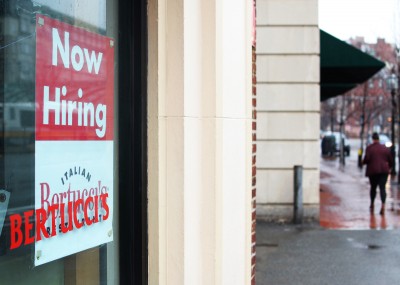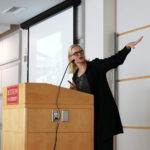
The job market in higher education has shown the largest increase in any one-quarter period since 2012. The market had a 1.25-percent increase, or approximately 24,100 jobs, in the fourth quarter of 2015, according to a HigherEdJobs report published Friday.
The report based its analysis on data from the United States Bureau of Labor Statistics and concluded that four-year colleges across the nation gained 29,400 jobs, while community colleges lost 5,300 jobs in 2015. The report also showed a 10.6-percent job increase in the New England area.
John Ikenberry, president and co-founder of HigherEdJobs, said the increase in the number of higher education jobs can be attributed to the growth of the U.S. economy overall.
“The factors that caused the increase can be a variety of things,” he said. “It can be an increase in enrollment at a decent number of institutions, or [colleges] are feeling more confident in both enrollments and the ability to set tuition. It shows some increasing confidence that these institutions have to be able to do their planning and hiring for those positions.”
Though the increase of higher education jobs in the fourth quarter of 2015 reached a high point, it was still lower by 0.11 percent in comparison to the increase of U.S. job market, Ikenberry said.
“When times are tough, the U.S. economy could be down significantly, more than higher education,” Ikenberry said. “And when things are better, the U.S. economy tends to be much better than higher education. Higher education is steadier, while education in the U.S. is more volatile.”
Despite a job increase over the past year, in the four-year category, jobs in community had decreased, Ikenberry quoted from the report. He said that as the economy improves, more people would likely leave their education and join the workforce.
“When the economy starts to improve, it would end up being a countercyclical effect on higher education,” Ikenberry said.
The report also pointed out a trend of increased employment in part-time positions with a 17.3-percent growth in the fourth quarter in 2015.
Higher education institutions, especially publicly funded institutions, are still recovering from the economic recession during the late 2000s, Massachusetts Department of Higher Education spokesperson Katy Abel said. Even so, the Commonwealth of Massachusetts continues to encourage the increase in higher education jobs.
“Massachusetts faces a shortage of skilled college graduates who are needed to work in [various] industries,” she said. “For Massachusetts, having a well-educated population of college students with degrees in what we call ‘high demand fields’ is important in the state’s economy. Therefore, investment in higher education tends to benefit an entire region or even an entire state.”
Several students expressed mixed views of the minimal increase in higher education job postings in comparison to other fields.
Grace Thomson, a first-year graduate student at the College of Communication, said the overlapping growth of other job sectors and jobs in higher education will cause workforce disparity in the future.
“If [jobs in] other fields are increasing, then we’re going to need more students entering … higher education to fill those [jobs],” Thomson said. “If the higher education job market is not increasing, then we might run into problems with too many students and not enough faculty.”
Melanie Medeiros, also a first-year graduate student at COM, said though the higher education sector offers substantial benefits, it has a higher entry level.
“Higher [education] jobs have better benefits than a job in regular commercial industry,” Medeiros said. “[However], it often requires more advanced degrees, which is marking it harder for people [to join the industry].”
Agnes Zhan, a sophomore in the Questrom School of Business, said the jobs boost in the higher education sector should still be appreciated.
“Maybe being a professor doesn’t [generate] that much money [compared to] other jobs,” Zhan said. “I don’t think it’s that bad that other job sectors’ [increases] are larger, as long as it’s increasing in higher education. Maybe people’s values change. That’s why they want to do something else.”
A previous version of this story presented HigherEdJobs President John Ikenberry’s saying “increase in enrollment at decent institutions,” instead of “increase in enrollment at a decent number of institutions.” This correction is reflected in the story above.




